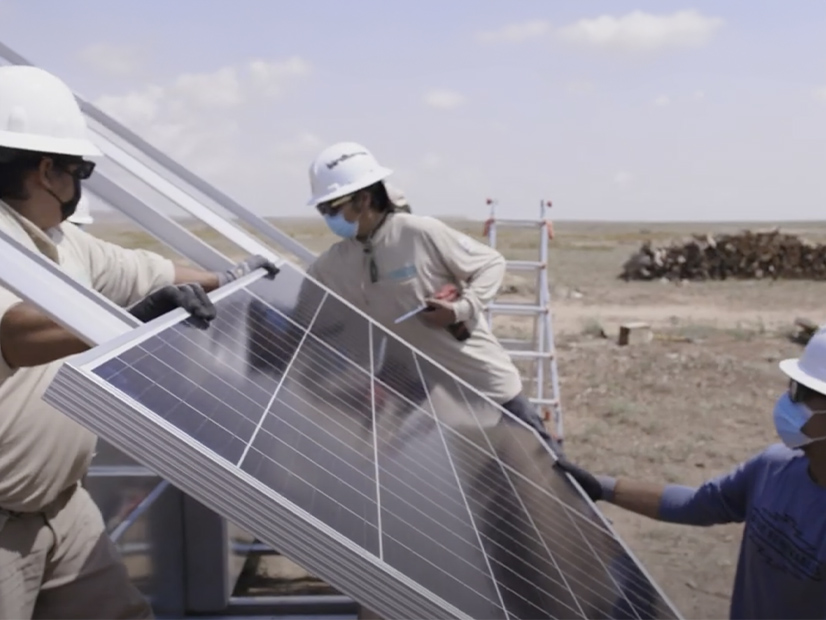
About 300 off-grid homes in the Hopi and Navajo nations soon could have electricity from solar and storage systems paid for with part of the $366 million in funding the U.S. Department of Energy announced Feb. 27.
The financial awards from the Infrastructure Investment and Jobs Act also will help install 675 whole-home heat pumps in manufactured houses in rural Maine, a microgrid with storage and floating solar panels in the small Colorado town of Fort Lupton and 14 similar clean energy projects in rural and tribal communities. According to the DOE announcement, the projects will be in 20 states and 30 tribal communities.
“Every community should benefit from the nation’s historic transition to a clean energy future, especially those in rural and remote areas,” Energy Secretary Jennifer Granholm said in the announcement.
The funding underscores the administration’s commitment “to building an inclusive and equitable clean energy future that creates safer, more resilient communities, enhances tribal energy sovereignty, strengthens energy security and delivers new economic opportunities in every pocket of the nation,” the announcement said.
The funding is part of DOE’s Energy Improvements in Rural or Remote Areas program, which is being administered by the Office of Clean Energy Demonstrations (OCED). All the projects are in or adjacent to disadvantaged, historically underserved communities with disproportionate levels of environmental pollution.
The focus on tribal communities in the continental U.S. and Alaska recognizes the historic and economic challenges these areas face. According to a 2023 report from DOE’s Office of Indian Energy, 21% of homes in the Navajo Nation (with a total of 45,000 residents) and 35% in Hopi tribal communities (2,810 residents) do not have electricity, which also means they may not have running water. The report also noted that 31% of tribal homes with electricity report monthly outages.
All projects designated for awards will enter negotiations for final contracts with OCED.
Other projects designated for awards include:
-
- Alaskan Tribal Energy Sovereignty project: If finalized, this $26 million award would help upgrade existing diesel-powered microgrids with solar and storage in eight remote tribal villages with no access by road and only seasonal access by boat and air. The upgraded systems could cut diesel use by 40% and cut energy costs across the communities by $100,000 per year.
- Microgrids for Community Affordability, Resilience and Energy Decarbonization: Led by the National Rural Electric Cooperative Association, this $45 million project would create a consortium of rural co-ops in Arizona, California, Minnesota, Montana and Tennessee. The co-ops would install microgrids with solar, storage and distribution system upgrades “to demonstrate region-specific energy systems that improve energy access, enhance energy resilience and increase capacity for renewable energy deployments at a community level,” according to DOE.
- Montezuma Microgrid project: With a population of 1,460, the town of Montezuma, Iowa, plans to use its $9.4 million award to build the state’s first utility-scale microgrid, including 2.5 MW of solar, 1.5 MWh of storage and electric vehicle chargers “to reduce reliance on aging infrastructure and backup diesel generation.”
All projects include community benefit plans with provisions for local job training and other economic development measures.
Contracts with OCED would require ongoing evaluations through a “phased approach” that includes a series of “go/no-go” decision points based on implementation progress, the announcement said.
In related announcements on Feb. 27, DOE opened a $25 million funding opportunity for additional tribal clean energy projects and an $18 million opportunity for “high-impact clean energy projects in disadvantaged communities, … small- and medium-sized cities and towns, and tribal communities.”
The $25 million funding for tribal projects will focus on clean energy and energy efficiency projects for tribal buildings, community-scale clean energy and storage projects, and integrated energy systems that can operate off grid.
The $18 million Communities Sparking Investments in Transformative Energy (C-SITE) program will prioritize funding for community-led projects that deliver direct clean-energy benefits, such as reduced energy costs and improved air quality, while drawing in additional investment for longer-term economic development.



